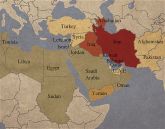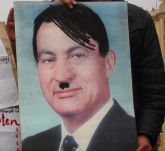×


We have detected your country as:
Please click here to go to the USA website or select another country from the dropdown list.
by: Rev. Cheryl Hauer, Associate Editor
 For decades, the propaganda machine of the Arab world has declared that Israel’s “illegal occupation of Palestine” is at the heart of all conflict in the Middle East. Unfortunately world leaders have been all too willing to dance to that tune, while ignoring the reality on the ground. But today, battles are raging, borders changing and mega-powers emerging in upheaval after upheaval, few of which have anything directly to do with Israel at all. The face of the region is going through a profound transformation, precipitated by constantly changing allegiances. Alliances are being formed, broken and formed again; ancient enemies suddenly become friends while traditional allies forsake one another to align with the “other” camp. And navigating the labyrinth is a challenge.
For decades, the propaganda machine of the Arab world has declared that Israel’s “illegal occupation of Palestine” is at the heart of all conflict in the Middle East. Unfortunately world leaders have been all too willing to dance to that tune, while ignoring the reality on the ground. But today, battles are raging, borders changing and mega-powers emerging in upheaval after upheaval, few of which have anything directly to do with Israel at all. The face of the region is going through a profound transformation, precipitated by constantly changing allegiances. Alliances are being formed, broken and formed again; ancient enemies suddenly become friends while traditional allies forsake one another to align with the “other” camp. And navigating the labyrinth is a challenge.
From the Cold War to 9/11, the United States was the recognized super power in the Middle East. For nearly 70 years, America traversed the political minefield of the region determined to prevent enemy regimes and terror organizations from gaining strategic positions from which to wreak havoc, to guarantee the flow of oil from the Persian Gulf through the Suez Canal, and to ensure the security of her Middle Eastern allies including Egypt, Iran, Syria, Israel, Saudi Arabia, Turkey, Jordan, Kuwait and the Emirates.
But, by the advent of a post 9/11 reality, allegiances were shifting and new power blocs emerging. The United States clung tenaciously to a position of authority and maintained a commitment to her allies who were considered pro-Western, moderate Arab states. US leaders avoided anything that would be perceived as the US selling out her friends.
-edit_165_156_80.jpg)
Photo by Kodak Agfa/ Egypt/wikipedia.org
The map of alliances began a dramatic transformation with the arrival of the Arab Spring and Syrian civil war. As violence broke out across the region, it appeared that the radical Muslim Brotherhood would be the regional victor. Egypt, Libya and Tunisia led the formation of a Brotherhood bloc which included Hamas (Gaza), Qatar and Turkey.
However, mass violent demonstrations were successful in crumbling that bloc, deposing Egyptian president Mohammed Morsi and replacing him with a military government led by General Abdel Fattah el-Sisi. Turkey, Qatar and Hamas remained allied with the Brotherhood while Egypt re-aligned with regional moderate Saudi Arabia.

Mubarak as the Fuhrer Photo by Kodak Agfa/ Egypt/wikipedia.org
Meanwhile, America’s seeming desertion of long-time US ally Hosni Mubarak and ensuing attempts to befriend the Muslim Brotherhood left her allies in the region confused and feeling betrayed. Combined with perceived US weakness in dealing with the Iranian nuclear crisis, America’s position as leader in the region suffered damage that will be extremely difficult, if not impossible, to repair.
The second emergent bloc was led by radical Iran. Critical to this shift were the US invasion of Iraq and the fall of Saddam Hussein, precipitating an upsurge of anti-American sentiment that mushroomed with the Arab Spring. Iranian support for Hezbollah flowed freely through new ally Syria, and shipments of arms made their way to Hamas in Gaza. All the while, Iran’s nuclear ambitions forged ahead with Russia’s support, while Israel’s warnings have gone unheeded.
The emergence of the Islamic State (ISIS), the most recent player on the scene, has thrown the region into further pandemonium. ISIS is the most well-funded, organized and most radical jihadi group to appear in recent history. As ISIS fighters sweep the region, the battlefront now stretches from the Iraq–Iran border to the Mediterranean Sea. The resulting instability is creating an almost indecipherable maze of allies and enemies.
In 2012, US President Barack Obama drew a red line regarding Syrian President al-Assad’s use of chemical weapons. When Assad crossed the line, Obama backed down. Now, the United States is assisting Assad in Syria’s fight against ISIS.
Iran has also joined the fight against ISIS, arming the Kurds…who are long-time Western allies. Iran is also lending support in Iraq’s fight against ISIS, even though the two countries are historic enemies.
Unfortunately, religious lines are of no help in this quagmire either. The population of Western ally Saudi Arabia is 80% Sunni. However, the Muslim Brotherhood and Hamas are also Sunni. But so are the Kurds. The majority of Syrian Muslims are Sunni, while the government is Alawite, a Shiite sect. Qatar, home of the largest US military bases in the region, is a Sunni monarchy but allies with Iran (who is Shiite), the Brotherhood, Hezbollah and Hamas.
As if this isn’t confusing enough, the nations are being increasingly drawn into the fray with seemingly little understanding of the long-term implications of their support. The Western commitment to back pro-Western governments who protect their citizens against human rights abuses no longer rings true. Governments throw support behind whoever seems to be the “good guy” in any given conflict, ignoring the fact that the West has only one stable, democratic ally in the entire region. That ally is Israel.
Yet, when a major conference was held in Cairo on October 10 to discuss the situation in Gaza and the future of the Palestinian state, Israel was the only nation asked NOT to attend. The 50 world governments represented there ran the gamut from liberal to conservative, those that support Israel’s right to self-defense to those that don’t, those that have recognized a Palestinian state and those that haven’t, etc…a maze of unlikely alliances, indeed.
Unjustly accused as perpetrator, Israel is surrounded by the fires of the Arab conflagration. As Middle East countries and their various “allies” battle each other for position on a changing landscape, it is glaringly obvious that the blame cannot be placed on Israel. Clearly, the “occupation of Palestine (sic)” is not at the heart of the conflict. The obvious culprits are regional power struggles with global ramifications, and international self-interests.
All logos and trademarks in this site are property of their respective owner. All other materials are property of Bridges for Peace. Copyright © 2025.
Website Site Design by J-Town Internet Services Ltd. - Based in Jerusalem and Serving the World.